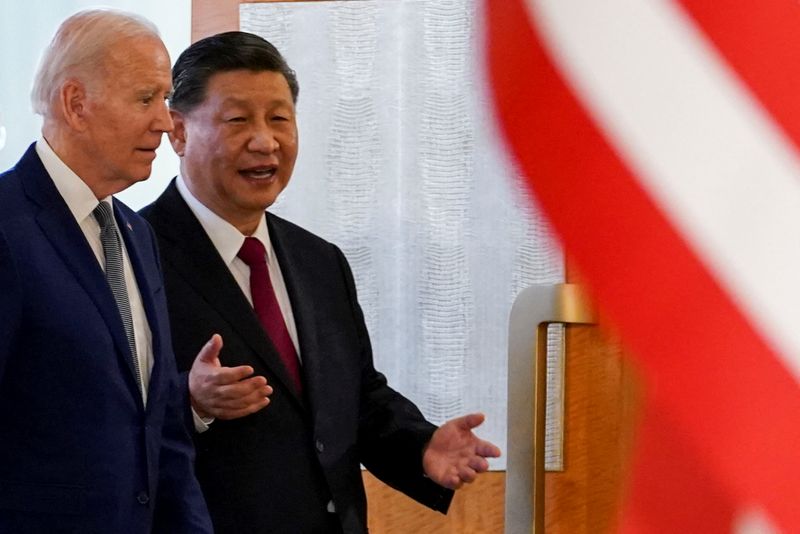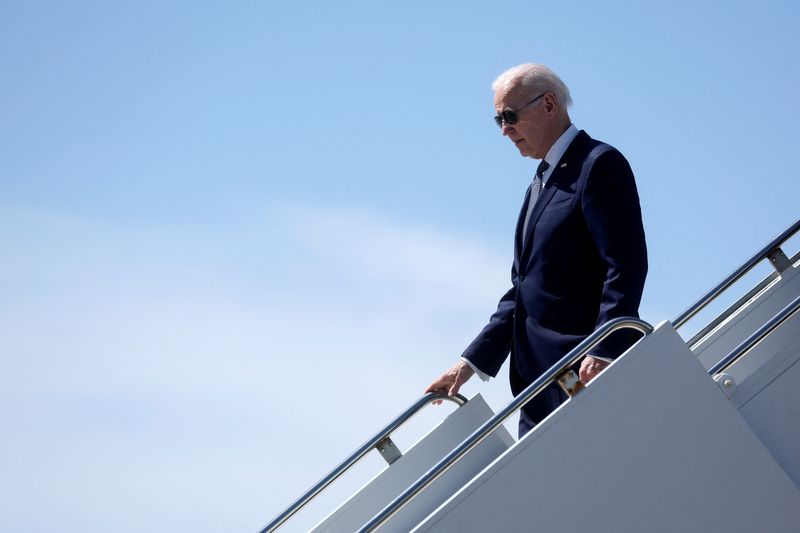By Steve Holland and David Brunnstrom
SAN DIEGO (Reuters) -U.S. President Joe Biden said on Monday after unveiling details of a major submarine deal with Britain and Australia aimed at countering China that he expected to speak to Chinese leader Xi Jinping soon, but declined to say when.
Asked at a meeting with British Prime Minister Rishi Sunak in San Diego if he was worried that China would see the AUKUS submarine deal as aggression, Biden replied "no."
Asked if he would speak to Xi soon, Biden said "yes," but to another question as to whether he would tell journalists when they would talk, he replied "no."
Biden said in mid-February he expected to speak to Xi about what the United States said was a Chinese spy balloon that flew through American airspace, worsening already tense relations, but no such call has been announced.
U.S. national security adviser Jake Sullivan said last week the United States wanted to re-establish regular communications with China and Biden expected to speak with Xi by telephone sometime after China's government returns to work following its annual National People's Congress that ended on Monday.
The AUKUS agreement to provide Australia with nuclear- powered submarines is aimed at countering China in the Indo-Pacific and Beijing has condemned it as an illegal act of nuclear proliferation.
"Competition requires dialogue and diplomacy," Sullivan told a small group of reporters last week in reference to China while discussing AUKUS. "We encourage the PRC (People's Republic of China) to have regularized patterns of communications at senior levels."
Asked when a call with Xi might happen, Sullivan replied: "When the People's Congress is over and the government, including the president, return to work in Beijing the (U.S.) president anticipates the opportunity to engage in a phone call."
"Over the course of 18 months we have communicated with (China) about AUKUS and sought more information from them about their intentions," Sullivan added, referring to China's military buildup, including nuclear powered submarines.
China's foreign ministry spokesperson Wang Wenbin told a regular briefing on Tuesday that both China and the U.S. were maintaining necessary communication.
"We believe that the value and significance of communication is to enhance the level of understanding and manage our differences, not to communicate for the sake of communicating. The U.S. side should come forward sincerely, with practical actions to promote China-U.S. relations," Wang said.
The Wall Street Journal reported on Monday that Xi plans to speak with Ukrainian President Volodymyr Zelenskiy for the first time since Russia's invasion of Ukraine. That call was likely to take place after Xi's visit to Moscow next week to meet Russian President Vladimir Putin, the newspaper said.

Sullivan told reporters en route to San Diego on Monday that Washington has been publicly and privately encouraging Xi to talk to Zelenskiy so that they hear "not just the Russian perspective" on the war.
Sullivan added that Ukraine had not confirmed a call between Xi and Zelenskiy.
